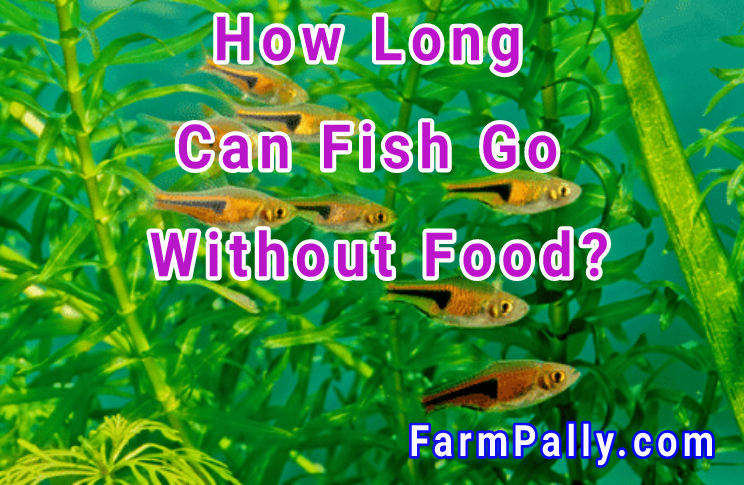Factors that determine how long a fish can survive without food
To determine how long a fish will survive without food, it’s important to understand their feeding habits.
Fishes can be herbivores, omnivores, and obligate carnivores, and their digestive systems reflect their diet.
For example, obligate carnivores have short guts, ideal for quick protein digestion, while herbivores have long guts, coiled intestines for breaking down plant matter.
Each fish species’ physiology, water quality, and age are also important factors that contribute to feeding habits, and digestion.
The age factor is simple to understand. Juveniles fry their depleted reserves quickly and usually require 2 to 3 feeding sessions daily while adult fishes can slow their metabolism and can endure longer fasts.
For their habitat, when the water temperature is warm, fish digest and metabolise their food quickly than in cool water temperature.
Also, fish in their natural habitat or in ponds benefit from natural foods like plants, algae, worms etc.
About the Water quality, oxygenation extends survival time; conversely, warm, less oxygenated water raises metabolic demand and shortens the safe fasting window.
How Long Will Fish Live without Food?
Irrespective of other factors, juveniles can survive 2 to 3 days without food while adult fish can survive up to a week without food, with an average being 8 – 10 days.
Let’s now look at some fish, and their survival rates.
How long can a Parrot Fish go without Food
As a hybrid cichlid with a relatively slow-moving lifestyle, adult parrot cichlids can live without food for 8 to 14 days under stable, coolish aquarium conditions.
While they do best with regular, varied feedings, they can be more vulnerable because of feeding-anatomy issues.
How long do Koi Fish live without food?
Koi fish in a temperate pond stop feeding as their habitat cools and can do without food for several weeks in winter.
When the water is well oxygenated, and the habitat encourages foraging, koi can do well in active seasons for a few weeks without supplemental feed.
How long will tropical fish go without food?
Aquarium fish can survive up to a week without food, but the chance of living after 7 days is rare.
Tropical fish can live up to 2 weeks if you control the water temperature and ensure good filtration.
Broader freshwater and marine mixes such as Freshwater tetras, barbs, and similar tropicals can go 1 week straight without food.
Many marine species are less tolerant though and may not live up to one week without feed.
Fry and juvenile community fish require daily feedings.
How long can Molly fish survive without food?
Mollies are hardy but metabolically active tropical livebearers.
Adult molly fish have an average of 1 week of survival without feeding, and younger ones can die off after 3 days of no food.
Can a Pet fish do without food?
Pet fish is a broad term that deals with different species of fish raised for ‘fun’.
For routine household species such as guppies, tetras, and platies, they can do without feed for a week.
For others, it could be less or more, but it’s important to assume a one-week tolerance fast.
How long can Goldfish live without food?
Goldfish are among the most forgiving home species.
In cool water, they can survive a week or longer without food, and at lower pond temperatures, they can go for weeks to months because their metabolism slows dramatically.
However, you should keep feeding minimally before travelling to avoid water-quality spikes.
How can you tell if a fish is hungry?
Hunger in fish is not like the way humans get hungry. When fish are hungry, they start foraging now and then.
You start seeing them nipping at decor or tankmates aggressively, and moving fast to any area they find something edible or their feeding area.
Some fish will sift substrate or scrape algae more intensely when food is scarce; others may show increased activity around the surface at feeding time.
However, apparent constant hunger can also be an adaptive behaviour in response to routine feeding or a sign of nutritional deficiency rather than true hunger/starvation.
How to feed your fish when you go on a vacation?
If you’re going on a short trip, there are 2 best ways to protect your fish from a long fast and death.
You can increase their food portions a few days before your vacation, and this is not to overfeed them once.
For trips that would take more than a week, you should use an automatic feeder that’s calibrated to deliver appropriate portions at the right time.
For most adult fish, a properly adjusted automatic feeder or a caregiver feeding them once per day will suffice for trips under a week.
For longer absences, you should endeavour to get someone who understands how much to feed and how to spot water-quality problems to feed and monitor your fish daily when you’re not around.
Decomposing uneaten food is a common cause of post-trip losses in fish farming.
Give clear instructions, species-specific to-dos like the portion size, feeding times, and what to do in certain situations, like when the water looks cloudy or fish act lethargic.
How long can fish live without food in a pond, bowl, or tank?
In a well-developed, oxygenated pond with forage and seasonal cooling, fish can go for several weeks without supplemental feeding, especially in winter when metabolism drops.
In tanks however, you shouldn’t expect the same survival rate. Here, most healthy adult tropical freshwater species tolerate roughly 2 weeks without food.
Coldwater aquaria and larger goldfish in cool conditions can survive longer than warm tropical tanks because lower temperatures reduce metabolic needs.
However, in Bowls or small, poorly filtered setups where there are poor and higher temperature swings, fish will suffer much and have a lower survival rate.

Growing up in a family deeply rooted in agriculture, I developed an early passion for cultivating the land, caring for animals, and exploring sustainable ways to improve farm productivity.
I’ve worked extensively across multiple areas of agriculture, food and cash crop cultivation, poultry farming, fish farming etc.
At FarmPally, I enjoy sharing practical insights drawn from real-life experiences to help farmers, pet owners, and agriculture lovers make informed, and sustainable decisions.

